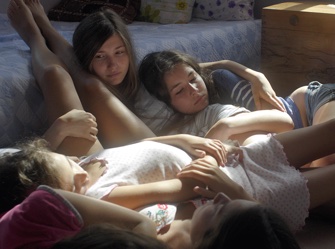
Mid-July is never a good month for new French movies. Almost always at this time of year, distributors tend to release the films they know are complete stinkers, usually “comedies” involving middle-aged men going on vacation. So this week’s movie review is stretching our usual parameters, as Mustang, the first feature-length film by Deniz Gamze Ergüven, is co-produced in France but is otherwise 100-percent Turkish. Watch out for this director’s name: she is an exciting new talent.
Seen through the eyes of 12-year-old Lale (an astonishingly mature performance by Güneş Nezihe Şensoy), the movie follows the lives of five orphaned adolescent sisters who live in an isolated Turkish seaside village, brought up by their grandmother and overseen by an authoritarian uncle. The story starts on the last day of school before the summer holidays, as the girls join a group of male schoolmates in a boisterous but fully clothed romp in the sea. This one act of youthful exhilaration leads to scandalized gossip in the ultraconservative village and the progressive imprisonment of the girls in their own home, as one by one (with the exception of the too-young Lale) the girls are lined up for arranged marriages.
While our sympathies are clearly supposed to lie with these teenagers who long for the freedoms of the Western world, this is most emphatically not a film about victimhood. All five girls are defiantly individual and linked in solidarity with each other. Much of the movie depicts their small acts of rebellion; the scene in which they escape to watch a football match is one to savor, as a sympathetic but horrified aunt does her utmost to cut the electricity so that the men of the village (who are watching the game on TV) cannot see the girls onscreen. Also, although arranged marriages are shown to be repressive, they are not depicted as being completely inflexible: the eldest daughter, for example, is able to persuade her grandmother to accept the boy whom the girl actually fancies.
The obsession with female purity leads to appalling medical invasions of the girls’ bodies. After the frolic in the sea, the sisters are inspected to see if their hymens are still intact, and one of the girls is frog-marched by her new husband’s family to the doctor to ascertain her virginity when she does not stain the bed sheets with her blood on her wedding night.
The hypocrisy of the adults’ emphasis on purity is pointed up by the uncle’s nocturnal visits to the girls’ rooms. Exactly what is going on is never elucidated, but it is clearly not pure in nature.
Although this movie has been and will be compared to Sofia Coppola’s Virgin Suicides, Mustang has a distinctiveness and urgency of its own, portraying the vivid contradictions of modern Turkish society with a sometimes humorous, often angry but always joyous eye. My advice is to avoid the ghastly summer-themed French movies coming out in the next few weeks and go see Mustang instead.
Favorite
